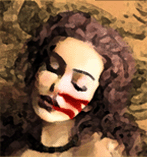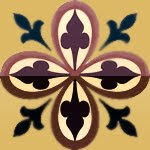By Edmond Jabès
Thus, along with lack,
anxiety was born.
A fallen apple – from the same branch that Eve
plucked hers – continues to spoil at the foot of
the felled tree.
Rotten fruit. Its name: ANXIETY.
Image of emptiness before emptiness.
Biting into the apple, did Eve know she was
devouring her soul?
What if the book were only infinite memory of
a word lacking?
Thus absence speaks to absence.
"My past pleads for me," he said. "But my future
remains evasive about the assortment in its basket."
Imagine a day without a day behind it, a night
without a previous night.
Imagine Nothing and something in the middle
of Nothing.
What if you were told this tiny something was you?
And God created Adam.
He created him a man, depriving him of memory.
Man without childhood, without past.
(Without tears, without laughter or smiles.)
Man come out of Nothing, unable even to claim a portion
of this Nothing.
Did God consider for a moment that with one stroke He
deprived this man of what He would in the future grant all
other creatures?
Adam, son of Nothing by the will of God, fruit of wanton benevolence,
fruit ripe before ripening, tree in full leaf before growing,
world completed before emerging from nothing, but only in
the Mind of God.
Man of strange thoughts on which, however, his life depends.
Man chained to the Void, chained to the absence of all
Absence
The past reassures us. Man without such security,
delivered to whom? to what?
Man without light or shadow, without origin or road,
without place, unless part of that place outside time which
is indifferent to man.
Things must feel this way. But no doubt even they have
their thing-memory, recalling wood and steel, clay or marble.
Recalling their slow progress toward the idea, the knowledge
of the thing they were to embody.
O emptiness! Nothing to lean against, nothing to rest on,
is this anxiety?
Time molds us. Without past there is no present, and the
I cannot be imagined.
Orphaned in the fullest sense of the term, of father and
mother, but also of himself - are we not engendered in that
moment of carnal and spiritual experience? - what could
seeing and hearing be for him? What could speaking or acting mean?
What weight has a word, what reverberations in
the future? What could it profit him? What contentment,
what soothing could he expect from any gesture?
Discoveries, encounters, surprises, disappointments,
wonder? Probably. But in relation to what other approaches,
in reply to which inner question, lacking all comparison?
The key lies in the fertilized egg, the ovule, the fetus.
The mystery and the miracle.
Fertile forgetfulness. It pushes us to sound soul and spirit
in the name of spirit and soul. It helps us clear the various
paths of consciousness, to learn and unlearn, to take what
is offered, whether by dawn or by night, daily, in short, to
create ourselves.
I am not. All I have ever been is the man life has allowed
me to be.
Thus I exist, molded by the best and the worst, by all I
have loved or fled, acquired or lost, molded by seconds at
the mercy of seconds as life drains away.
Eve came out of Adam's sleep, woke next to him by the
will of God. She, too, a woman without having been a
child, not having seen her body grow and develop, felt her
mind open out, giving full rein to voluptuous sexual desires
or fighting them.
They looked at each other without a word. What could
they say? They could only observe, only study their difference.
Days of boredom, of uneasiness followed. Of anxiety, too.
They were God's playthings. Living together, yet unable
to get anything from each other. Living, yet without landmarks
of existence, not even a picture, a portrait which
would bear out that they were real.
Only an unfamiliar body and a mind unable to think.
Enter the serpent. Enter into their ears the blandishing
voice of the reptile, which was perhaps only the urgent
voice of their anxiety.
Ah, this need to know, which on their part was not just
curiosity, but the hope to be healed. For God had im-
planted suffering in them, the hurt of being. God had made
a mistake. God had done wrong.
What if Eve's sin were really the sin of God which Eve,
for love of Him, took on herself? Both a sin of love and the
mad wish to save herself and save Adam?
Anxiety had encouraged the act, hastening the coming of
their freedom.
Breaking God's commandment meant, for one and the
other, finding their humanity.
Nature taking its revenge, the sin of the flesh will prove
to be only the sin of procreation, of glorifying the seed.
Ephemeral eternity of what is born.
Eve and Adam cherished in advance, through the childhood
they never had, their fragile, future offspring. For
God had already left them to their fate only to be in turn
forsaken by them. Their freedom – O solitude and
wound – issued undeniably from this double desertion.
But two questions remain.
Did God know, when He created man, that He could
never make a man of him because he could only become
one by himself?
Did Eve's weakness later seem a lesson to God, and to
Adam, an essential test leading to their particular conscious-
ness of existence, to the acceptance of life and death?
translated by Rosmarie Waldrop
Send to:




ارسال یک نظر